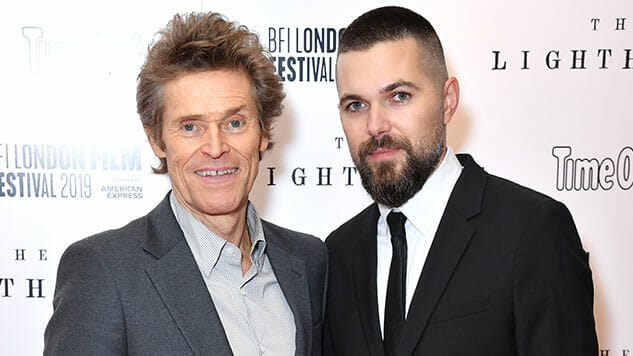Robert Eggers Is Ready to Do Worse Than The Lighthouse
Photos via Gareth Cattermole/Getty Images
Robert Eggers’ The Lighthouse isn’t exactly a theme park ride, though he likes to think of his sets as his personal Disney-adjacent macabre funfair. The film is equally as delightful as it is delirious, a mindscrew built to turn isolation into revelry that ends with violence—offering a sight so apocalyptic that Eggers doesn’t fully reveal it to his audience, lest his audience go mad. Farts, fanaticism and fear: all the comforts of a home on the edge of the ocean.
Paste sat down with Eggers to talk about The Lighthouse’s ins and outs, the technical challenge of shooting in cramped, remote quarters, and why Willem Dafoe’s character won’t stop farting in Robert Pattinson’s face.
(Note: This interview has been edited for length and clarity.)
Paste Magazine: I was going to ask you about New England and whether you’re going to keep making movies in New England, but I just heard you’re making a viking movie, so.
Robert Eggers: There should be a third New England horror-adjacent folk something. I would definitely want to do that, but you’ve gotta make a viking movie when you get the chance.
Paste: What do you look for in a setting? I know you’re only two films in, but I feel like people do associate you with New England by now, between The Witch and The Lighthouse.
Eggers: Sure, though I also wrote a screenplay that took place in a fictional, central European city, something in Biedermeier, Germany, and Transcarpathia, something in Siberia, something in medieval Britain. It’s just that the two New England things got greenlit, right. [laughs] I’d love to do a Western, but folklore, fairytales, mythology, religion, sometimes the occult: Those are the things that excite me. And the past.
Paste: “Never” is a strong word, but you won’t really think about the present when you make your movies. You’ll think about going to a period and really living in it.
Eggers: Yeah. I mean, I’m honestly exploring where we are and where we’re going by looking at where we come from, but obviously it has to be about today, right? … I’m trying, when I am doing these period pieces, to step into the minds of the people from that period. I try to lock myself away in the past as much as possible. But I don’t live in a vacuum and I am affected by the zeitgeist. You can’t not be. And that’s great again, cause otherwise movies wouldn’t work! But if anyone finds them to be unique, it’s just because I’m playing in a space that less people are in right now.
Paste: So if you’re looking at the past to look at where we are now, how does that apply to The Lighthouse? I walked out of this movie feeling like I hadn’t had this much fun going insane in a long time, but also thinking that it’s so wide open for interpretation that you could find meaning in it in all kinds of different directions.
Eggers: Yeah. My brother and I—he wrote this with me—we were striving for something archetypal. I always am. That’s hard to do. If it is archetypal, then it can exist for a while. Marie-Louise von Franz, a prominent Jungian, said that the fairy tales of Hans Christian Andersen are going to slowly disappear because they were too influenced by the Victorian era and the Victorians repressed everything. And I think that she’s not wrong. Some of his stuff is sticking around—The Little Mermaid blah, blah, blah—but a lot of those things don’t have the shelf life that Grimm fairy tales do. Now, I dunno how Robert Pattison masturbating in a lighthouse fits into that paradigm, but…
Paste: It sounds like this is almost, in its own way—its very unique, batshit way—an act of preservation. Is that going too far?
Eggers: That’s not going way too far. I mean, obviously this movie’s quite juvenile and grotesque and unapologetically…unapologetic? [laughs]
But yeah. There is a way in which in both of these films, I am trying to commune with the folk culture of my region. Obviously both films, in the way that the characters speak, is my interpretation of the past, but yeah… [I am] trying to understand and preserve something. That’s cool. I’m down with that.
-

-

-

-

-

-

-

-

-

-

-

-

-

-

-

-

-

-

-

-

-

-

-

-

-

-

-

-

-

-

-

-

-

-

-

-

-

-

-

-








































